Is Texas' Operation Lone Star another example of a program once started, never ends?
State Sen. Bryan Birdwell asked the quiet part out loud regarding the ever-spreading tentacles and ever-escalating costs of Texas' border security initiative: "How long can we do this?"
Birdwell, a Republican from Granbury who chairs the Texas Senate Committee on Border Security, received no direct answer to his question during a committee hearing Wednesday. But Mike Banks, Gov. Greg Abbott's border czar, said Operation Lone Star launched in early 2021 to battle a rise in unlawful immigration and might have to get bigger before anyone can think about shrinking it. The initiative has ballooned to an $11 billion price tag and now features a military base camp that is under construction along the Texas-Mexico border in Eagle Pass.
But Birdwell's concerns about lawmakers one day having to face declining revenue — and history shows that Texas is not immune to cyclical budget shortfalls — highlight a truism about expensive government initiatives at both the state and federal levels: Once they are in place, a constituency forms around them because they bring money and jobs to the section of the state where operations are centered. And the prospect of dismantling them is economically painful for the affected region, and therefore politically very difficult to do.

After the collapse of the Soviet Union and the thawing of the Cold War in the early 1990s, the U.S. Defense Department set about closing military installations across the country simply because the large force needed for the frightening prospect of fighting World War III was no longer necessary.
Congress as an institution fully understood that. But individual Congress members with vulnerable military bases that anchored countless jobs, troops and civilians in their districts fought tooth and nail to keep them open. Or to draw down as much federal money from the Department of Defense Base Closure Account as they could get their hands on to repurpose the bases for civilian use and ease the pain of transition.
More: In hunt for cartel hitmen, Texas Ranger's biggest obstacle may be the border itself
Operation Lone Star, because of the sheer geographical size of Texas' border, is spread farther and thinner than Fort Bliss or Corpus Christi Naval Air Station, meaning its local economic effect is also wider. But that spread does take in more constituencies.
The thousands of National Guard soldiers and airmen and the Department of Public Safety troopers deployed to South Texas probably spend a fair portion of their paychecks in the cities and towns where they are based. That's good for local shop owners, restaurants, hotels and probably even a pawnshop or two.
The sheriffs whose counties are on the border and a few whose counties are the buffer between South Texas and the rest of the state have been on the receiving end of tens of millions of dollars from the state to offset the cost of helping with Operation Lone Star. If those dollars dry up, away go the deputies whose salaries are covered by that money and perhaps too the maintenance costs of equipment that came in courtesy of the Legislature.
More: Wedged between politics and Texas muscle, migrants thread dangerous path across border
Then there's Abbott's vaunted Forward Base Camp, which was just activated on 80 state-purchased acres near the Rio Grande in Eagle Pass. It was built to accommodate up to 2,300 soldiers and has barracks, a mess hall, a recreation center and a laundry and a library. All that gives the facility an air of permanency and might even attract a couple of fast-food joints and a watering hole or two for off-post, after-hours R&R.

A further unknown in mid-June 2024 is who is going to be setting national immigration policy in January 2025 when two things happen almost at once. In Washington, a president is going to be inaugurated, and in Austin, a Legislature will be convened.
Under one scenario, Abbott and Texas lawmakers are going to feel compelled not only to keep Operation Lone Star flush with cash but to take Banks' cue and extend its reach even farther. The other scenario might have the governor and the Legislature thinking that a possibly new federal administration is going to inherit the border just how the old one left it and that Texas has got to give the incoming president's team all the help it needs until it gets itself up to speed.
And all that suggests that the answer to Birdwell's "how long" question is: probably for quite a bit longer.
This article originally appeared on Austin American-Statesman: Will Texas' Operation Lone Star ever end? Why the answer is elusive.

